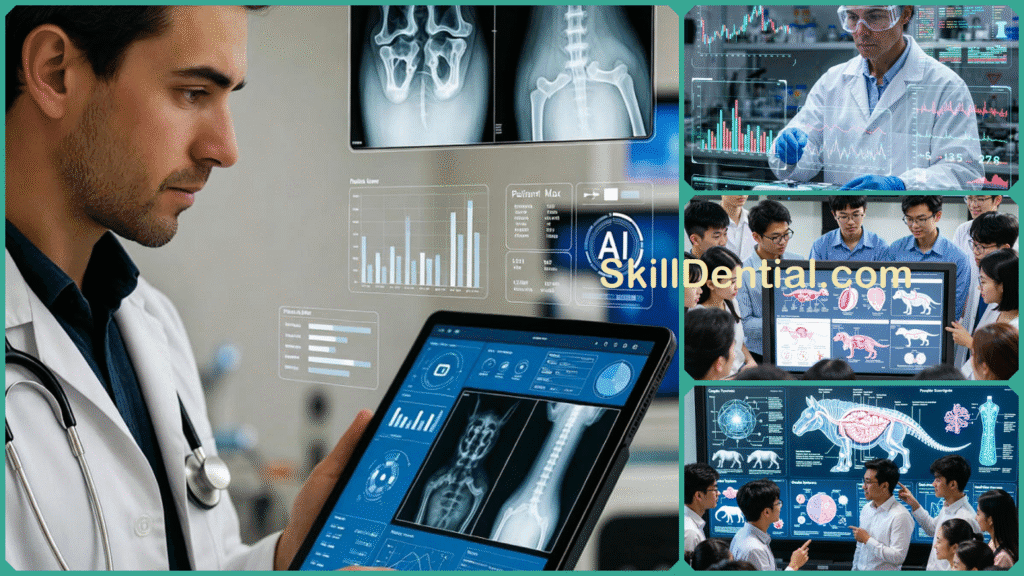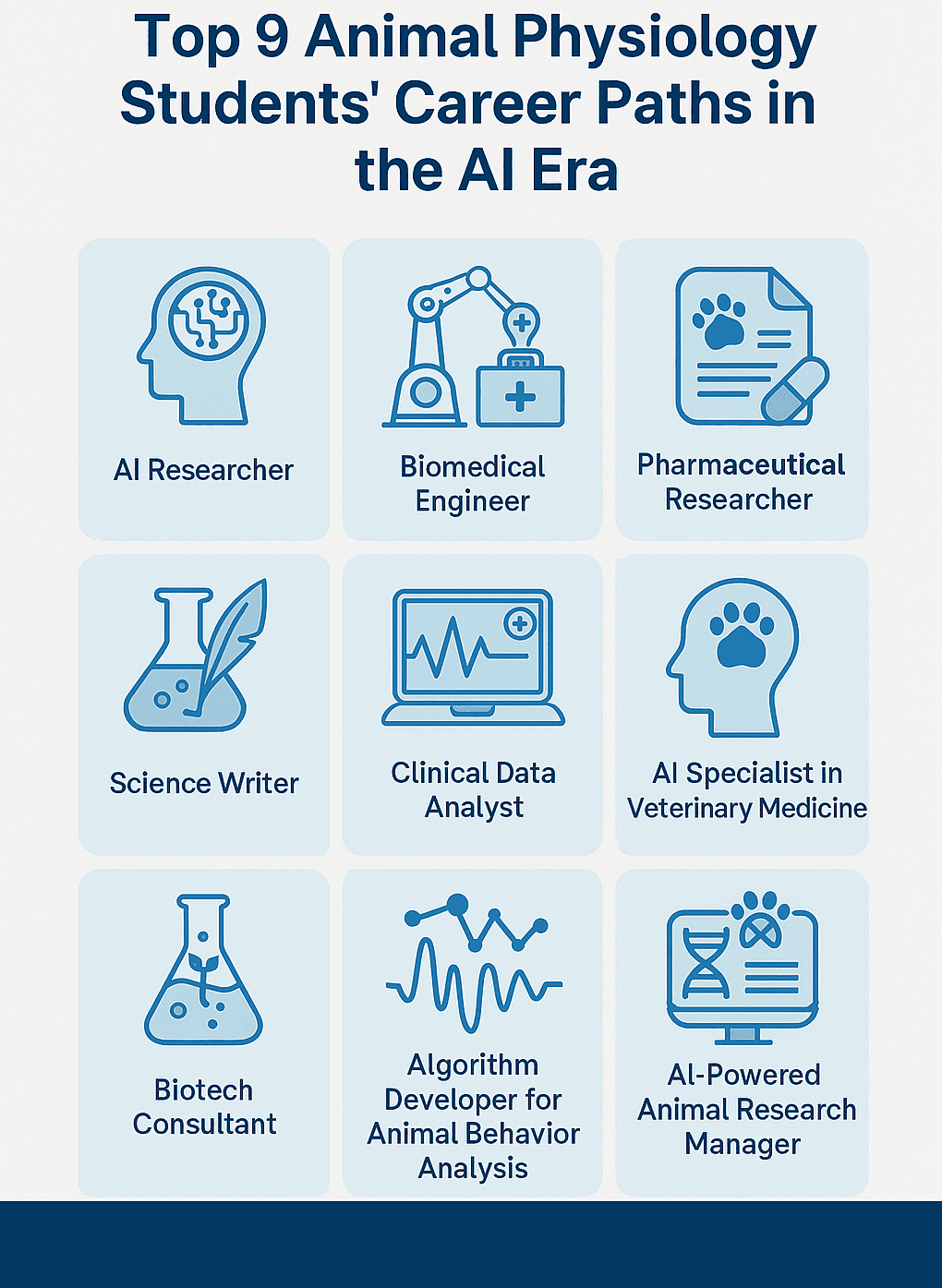Students studying animal physiology have a highly promising and exciting future ahead of them in the rapidly evolving era of artificial intelligence. Rather than being replaced by emerging technologies, their specialized expertise is increasingly being enhanced and supported by these advancements.
By integrating their solid foundational understanding of physiological processes with valuable AI-related skills such as machine learning, advanced data analysis, and sophisticated image processing techniques, these students open the door to a wide variety of diverse and future-proof career opportunities.
These opportunities span multiple fields, including cutting-edge research, veterinary science, modern agriculture, wildlife conservation efforts, and many other related disciplines, ensuring a broad and impactful professional landscape.

The rise of artificial intelligence (AI) is transforming many scientific fields, including animal physiology. For students majoring in animal physiology, veterinary science, zoology, or related life sciences, concerns about how AI might impact their careers are natural. However, AI offers powerful tools to enhance physiological understanding and drive innovative solutions in animal health, welfare, and management.
This article explores nine compelling career paths where combining animal physiology expertise with AI competencies creates a competitive edge and lasting job security. The discussion aims to educate students and educators on the relevance of AI, provide clear action steps to seize opportunities, and inspire confidence about the future of animal physiology professions.
Key Concepts and AI Integration in Animal Physiology
Animal physiology studies vital functions and mechanisms in animals, including systems like reproduction, metabolism, and behavior. With AI technologies such as machine learning, computer vision, sensor networks, and data analytics, this foundational knowledge is now greatly enhanced. For example, AI allows:
- Precise physiological data collection and interpretation
- Predictive modeling of animal health and diseases
- Automated monitoring of livestock and wildlife welfare
- Integrative solutions for conservation and agriculture
Understanding AI fundamentals—like Python programming and ML model development—equips animal physiology students with the skills needed to engage in interdisciplinary research and develop AI-powered tools. AI algorithms can uncover complex physiological data patterns that traditional methods might miss, thus combining biology with data science and technology to create innovative career opportunities.
AI applications in animal physiology research cover a wide spectrum. Machine learning and deep learning models improve veterinary diagnostics by analyzing imaging data (e.g., X-rays, ultrasounds) more quickly and accurately. AI-driven sensor data analysis tailors environmental adjustments to optimize livestock health and productivity.
In genetics and breeding, AI aids in predicting desirable traits such as growth rate and disease resistance, enhancing sustainable farming. Furthermore, AI-powered behavioral analysis supports real-time welfare assessment and early disease detection in animals. These advancements not only increase productivity and welfare but also enable personalized veterinary care and conservation strategies more effective than traditional methods.
Concretely, recent research includes projects developing AI classifiers to analyze animal blood tests to improve diagnostic accuracy rapidly. Another significant trend is the automation of patient diagnosis by feeding real-time data through AI platforms to support veterinary clinicians efficiently.
AI’s integration in multiomics data analysis and ecological modeling further broadens its impact on physiological research and animal health management. Despite challenges like data quality and ethical considerations, AI remains transformative, facilitating better decision-making and enabling personalized and sustainable animal care approaches.
In Summary
AI in animal physiology research significantly empowers both students and professionals by enabling them to enhance their expertise with valuable data science skills, thereby opening up a wide range of diverse and future-ready career paths.
Actively engaging with advanced AI tools such as machine learning algorithms, computer vision techniques, and big data analytics has become essential to fully capitalize on this rapidly evolving landscape. This proactive involvement ensures that deep animal physiology knowledge remains highly relevant, vital, and cutting-edge in the ever-expanding AI-driven era.
Top Career Paths for Animal Physiology Students in the AI Era

The job market is evolving at an incredibly rapid pace, and nowadays, merely possessing a degree in animal physiology is no longer sufficient to guarantee success. The most rewarding and in-demand career paths increasingly require a combination of deep biological knowledge along with advanced computational skills.
To help you navigate this dynamic landscape, here are the top 9 roles where your understanding of animal function is greatly enhanced—not supplanted—by the power of AI technology.
AI-Driven Veterinary Diagnostics Specialist
This role uniquely combines an in-depth understanding of animal physiology with advanced artificial intelligence technologies, such as image processing and pattern recognition, to develop sophisticated diagnostic tools capable of detecting diseases at an early stage with high accuracy.
Essential skills in AI required for this position include a deep proficiency in various machine learning algorithms, comprehensive expertise in advanced medical imaging techniques, and robust programming abilities specifically in Python. These competencies are critical to effectively develop, implement, and optimize AI solutions within the medical field.
Students aspiring to excel in this field should prioritize data science electives and actively seek opportunities to participate in veterinary AI research projects, which will help them gain valuable, hands-on experience and build a solid foundation of relevant expertise.
Precision Livestock Farming Analyst
These analysts utilize advanced AI-enabled sensors combined with big data analytics to continuously monitor and optimize both animal health and overall farm productivity in real time. Their work involves the seamless integration of Internet of Things (IoT) devices, sophisticated data analytics techniques, and cutting-edge sensor technology to gather and interpret vast amounts of information.
Key skills necessary for success in this field include expertise in IoT system integration, proficiency in analyzing complex datasets, and a strong understanding of sensor technologies. Students gain valuable knowledge by learning the fundamentals of IoT as well as mastering data visualization tools, which collectively support the development of smarter, more efficient farming practices that enhance productivity and sustainability.
Wildlife Conservation Data Scientist
By carefully analyzing a wide range of behavioral and physiological data collected from various wildlife species using advanced artificial intelligence techniques, these specialists play a crucial role in supporting numerous conservation initiatives and effective ecosystem management strategies.
Their extensive and comprehensive toolkit encompasses highly sophisticated machine learning algorithms, in-depth and detailed ecological modeling approaches, as well as expert-level programming skills, primarily focused on popular and powerful languages such as R or Python.
Students interested in this field are encouraged to actively pursue research in ecological data science and thoroughly explore the diverse applications of AI within different conservation contexts to contribute meaningfully to the preservation of biodiversity.
Animal Behavior AI Researcher
This career involves the development of advanced AI models designed to interpret and analyze animal behaviors captured through video recordings or sensor data. These AI-driven insights play a crucial role in enhancing animal welfare and supporting ethological research, providing a deeper understanding of behavioral patterns.
Key AI domains relevant to this field include computer vision, which enables machines to process and understand visual information; behavioral analytics, which focuses on interpreting and quantifying actions and responses; and neural networks, which are essential for modeling complex patterns and learning from data.
Students interested in this career path should focus on studying computer vision technologies in depth and seek opportunities to collaborate closely with behavioral scientists to integrate expertise from both AI and animal behavior research.
Pharmaceutical Research Scientist in Animal Models
Scientists working in this specialized area extensively utilize artificial intelligence technologies for drug discovery and the development of physiological models during preclinical animal trials. This approach significantly enhances the precision of experimental results while simultaneously reducing overall research costs and time.
Essential skills required for professionals in this field include a strong foundation in bioinformatics, proficiency with machine learning algorithms, and expertise in statistical programming techniques. It is highly recommended that students and researchers pursue coursework focused on bioinformatics and statistics to build the necessary knowledge and capabilities for success in this advanced scientific domain.
Biomedical Engineer Specializing in Animal Health Devices
This career path involves the design and development of advanced AI-powered health monitoring devices and implants that enable continuous, real-time physiological tracking and analysis. The required skills for success in this area include expertise in embedded systems design, AI programming techniques, and biomedical instrumentation development.
Students pursuing this academic path should concentrate on deeply integrating knowledge from the diverse yet interconnected fields of physiology, biomedical engineering, and artificial intelligence. They are encouraged to carefully select relevant elective courses that effectively bridge these interdisciplinary areas, thereby gaining a comprehensive understanding and skill set that combines principles from each discipline cohesively and practically.
Agricultural AI Consultant
Consultants play a vital role in advising farms and agribusinesses on how to effectively integrate artificial intelligence technologies into various aspects of animal husbandry, with the ultimate goal of enhancing animal welfare and boosting operational efficiency.
These professionals require a deep level of expertise in several key areas, including systems integration to ensure seamless technology adoption, accurate data interpretation to make informed decisions, and comprehensive AI strategic planning to align technological solutions with business objectives.
Additionally, building a strong interdisciplinary knowledge base that combines animal science with advanced AI technologies is absolutely crucial for consultants to provide innovative, tailored solutions that meet the unique needs of the agricultural sector.
Academic Researcher in AI-Enhanced Physiology
Researchers working at the academic level are pioneering innovative AI applications specifically in the field of animal physiology, significantly advancing both the technological landscape and educational methodologies.
Their comprehensive skill set encompasses advanced artificial intelligence techniques, meticulous experimental design, and proficient grant writing abilities. Pursuing graduate studies that focus intensely on the integration of AI in physiological research is absolutely essential for developing expertise and driving future breakthroughs in this interdisciplinary area.
AI Ethologist and Welfare Specialist
This interdisciplinary role focuses on the development and creation of advanced AI-human hybrid systems specifically designed to assess and interpret animal emotions and overall welfare by analyzing a combination of physiological signals and behavioral data.
Essential skills required for this position include a deep expertise in emotion recognition algorithms, a comprehensive proficiency in advanced computer vision techniques, and a strong, unwavering commitment to ethical AI collaboration practices that prioritize transparency and fairness.
Students pursuing this field should aim to acquire a deep understanding of AI ethics, comprehensive knowledge of welfare science principles, and practical experience in computer vision technologies to effectively contribute to this innovative area of research and application.
In Summary
Each of these career paths highlights the importance of integrating strong AI and data skills with animal physiology knowledge to thrive in the evolving job market. Immediate action steps for students include taking programming and AI-related electives, participating in interdisciplinary research, and seeking internships in tech-forward animal science environments.
This prepares them well for impactful, resilient careers where AI enhances rather than replaces their unique expertise. These paths collectively demonstrate how AI-powered tools open new frontiers in animal health, welfare, and environmental conservation, offering exciting opportunities for physiology students.
Current Trends and Developments
AI adoption in animal physiology is accelerating rapidly. Recent projects demonstrate AI’s capability to interpret animal emotions via facial recognition and body condition analysis, enabling unprecedented welfare insights. AI-powered systems now predict parturition and monitor health in livestock with minimal human intervention.
These significant advancements clearly demonstrate that artificial intelligence serves as a vital and indispensable partner for physiologists, complementing their expertise and enhancing their capabilities, rather than acting as a mere substitute or replacement for their skills and knowledge.
The integration of artificial intelligence with wearable sensors and advanced big data analytics is fundamentally transforming the field of precision livestock farming. This innovative combination not only significantly reduces the labor requirements traditionally associated with managing livestock but also greatly enhances sustainability efforts within the agricultural sector.
Furthermore, the ongoing interdisciplinary collaboration among AI engineers, animal scientists, and ecologists is leading to the development of groundbreaking products and technologies. These innovations effectively tackle a wide range of challenges, benefiting both agricultural productivity and environmental conservation goals in meaningful ways.
FAQs
Will AI make animal physiology jobs obsolete?
AI is a tool that enhances animal physiology roles by enabling more sophisticated data analysis and decision-making, rather than replacing expertise. Professionals with combined knowledge in physiology and AI are in high demand to leverage new technologies effectively.
What AI skills should I learn as an animal physiology student?
Focus on foundational AI skills such as machine learning basics, Python programming, data analysis, and computer vision. Mastery of these areas equips students to participate in diverse AI-driven projects within animal health, research, and management sectors.
How can I gain practical experience with AI in animal physiology?
Engage in research projects centered on AI applications in veterinary science or animal biology. Pursuing internships with veterinary technology firms or collaborating with AI laboratories working in life sciences are excellent ways to build relevant hands-on experience.
Are there postgraduate options combining AI and animal science?
Many universities now offer graduate programs that merge bioinformatics, AI, and animal science. These Master’s and PhD programs prepare students for advanced interdisciplinary roles by focusing on AI tools in physiological research and animal health management.
How can educators update curricula to prepare students?
Educators should integrate AI fundamentals, data science methodologies, and interdisciplinary projects involving real-world AI case studies in animal health and conservation. This approach ensures students graduate with skills aligned to evolving industry demands, fostering adaptability and innovation.
In Conclusion
The future for animal physiology students in the AI era is bright and full of opportunity. Rather than rendering traditional expertise obsolete, AI is revolutionizing the field by augmenting the value of deep physiological knowledge with advanced analytical and technological tools.
Students who combine their understanding of animal biology with sought-after skills in machine learning, data analysis, and computer vision will find themselves in high demand across a range of impactful careers—from veterinary diagnostics and wildlife conservation to agricultural consulting and academic research.
Embracing interdisciplinary learning and digital fluency, today’s animal physiology students can confidently navigate the changing landscape, turning uncertainty into a strategic advantage. By actively seeking out AI-focused electives, hands-on projects, and collaborative opportunities, they position themselves as innovators capable of solving complex problems in animal health, welfare, and environmental sustainability.
Ultimately, AI is not a threat but a catalyst—empowering animal physiology students to become leaders in a dynamic, future-ready workforce. The journey starts now: invest in your technical skills, stay curious, and seize the multitude of new career paths that AI is opening in animal science.
Discover more from SkillDential
Subscribe to get the latest posts sent to your email.


